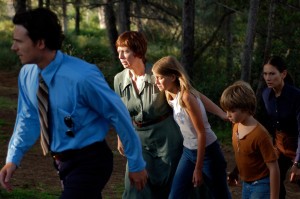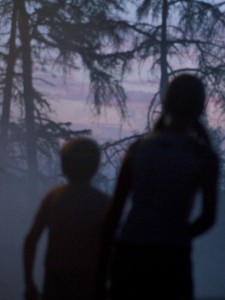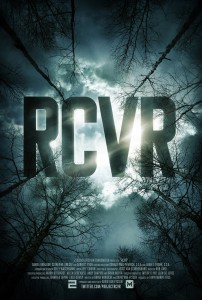- t

- The cast of RCVR – Season 1 | ©2011 RCVR Productions
When the first episode of the transmedia series RCVR made its debut in September (you can find the episodes – HERE), it took the internet by storm – amassing a million views in a little less than a week, with the other five installments clocking in with similar impressive numbers.
Created and directed by David Van Eyssen, the series is set in 1973 where an extraterrestrial encounter has massive ramifications for an American government operative.
What sets RCVR apart from many other web series was the size and scope – the project looked huge and could have existed as a film or a TV series with its major special effects and sweeping story. This being a transmedia project, the story didn’t stop with the web series, as the show’s reality was extended throughout the web with four different websites expanding the experience that included breaking into a Top Secret government site called SIGMA (www.sigma-agency.org).
Bringing all of this together was RCVR producer Tavin Marin Titus. Building on her early work with filmmaking legends Dean Devlin and Roland Emmerich on INDEPENDENCE DAY and GODZILLA, she has come into her own producing theatrical hit and WGA award winning WHO KILLED THE ELECTRIC CAR?, Emmy nominated MAMMOTH, and others including ODYSSEUS: VOYAGE OF THE UNDERWORLD.
This experience working on both big budget and low budget films brought a wealth of experience to RCVR that allowed the series to prosper despite its modest budget.
In this exclusive interview, Titus speaks about Season 1 of the web series and what the future might hold. There may even be a clue to unlock more of the RCVR experience if you pay close attention.
ASSIGNMENT X: It must be a daunting task doing epic science fiction on a web budget – how did you pull of making RCVR look so good for this medium?
TAVIN MARIN TITUS: I never looked at the Internet as a downgraded version of television. Watching something online is not about creating something of lesser value or a reduced experience because of the size of the screen. I really feel production for the digital space should be approached the same way you would approach production on a motion picture or a television property. The value was maintained to benefit the storytelling experience. Audiences should expect quality.
AX: The fact you were able to get a script written, and have it produced and airing on the Internet in less than two months is pretty crazy. How were you able to pull this off and at this level in such a short amount of time?
TITUS: There are a variety of factors involved. Certainly working with someone like David, who has a very clear vision was the first step to making this show a success. David and I know how to manage financial constraints to make a project compelling both from a visual and storytelling capacity without breaking the bank. We were able to sit down together and make decisions together rather quickly when we needed to. We had a tremendous amount of freedom with Machinima in making those decisions and I think that helped as well. So we weren’t in a situation where we had to ping pong back and forth in development for very long.
The project that we pitched and wrote that was greenlit, was what we were bringing to the screen. We were really left the freedom to let the train leave the station and make it to its destination. They trusted us, because we had the experience of doing it before and had a reputation of delivering high quality projects. We also made the decision to involve our department heads early on, so when we hit the ground running, we knew exactly what we wanted to make and as we ran into production constraints we made decisions with our creative partners together. It was a collaborative process.
AX: Were you surprised at how fast fans took to the project?
TITUS: That’s been one of most fascinating elements of this journey in understanding how a new media audience reacts to programming. I come from a world – trained under the big studio system as well as working as an independent producer where your ability to draw on an audience is attributed to your marketing plan and your ability to put that message out for someone to see. Not that this idea is eliminated for online programming, but in the digital world, there are these pockets of opportunities where the audience can come and find you, which is different than the process of the audience going to the theater or flipping through TV channels. This is the kind of audience where you would find suddenly thousands of spikes of viewers attributed to one person’s tweet. There is no way to track that or anticipate it. It was one of those surprises.
With that comes certain risks. One bad review could create a whole landslide of negative responses, but on the flip side it’s such a wonderful opportunity to gain a whole audience you might not be seeking out. There is something exiting about that journey. You feel you can put stuff out in the world and people can come find it. There is not a formulaic established method to it. Being one of the pioneers of the processes, it’s interesting putting stuff out there and understanding the mechanics behind it and finding this journey so we have clearer paths of where we want to be and where we want to go. It’s also interesting how primitive the measurement of online video is, particularly around engagement.
AX: The transmedia experience was also ambitious in that it created extra content outside of the series. Is there ever a point where you worry you’re duping an audience to believe that this reality exists – or is that part of the process?
TITUS: I think it almost depends on the viewer or user. I think they’re just looking for an interesting journey. Along the way, if you find out this is part of the fiction. They love that fine line, and I think that’s something that’s very exciting about the genre where you can dance between those two lines. What you thought was fantasy is part of the reality.
We’re living in that age where what you create, becomes a reality to some extent. I don’t think we need absolutes anymore in a square box. The idea is how do we step outside that box where we can create avenues where people don’t have to be in that box anymore. Anyone that’s developing programs right now for television that’s not thinking beyond the passive viewing experience is short-charging their audience. That’s why we all go to social networking – so we can be part of the extended experience.
AX: You’ve been involved with big budget event films and Syfy Channel movies – you come from all these different roles and budget ranges. As a producer, it must give you a wealth of knowledge to suck in and utilize to achieve what you want, because you have such a broad range of experience?
TITUS: Shaping the idea and finding another way to extend the storytelling experience has been something I’ve been trying to do for the last four years. I’m particularly interested in the mechanics of workflow and how to set up a production where all those different layers can be intertwined.
Studios and production companies can be quite set in their ways of how they make a film or TV show. In a way, we’re reinventing how we can line up the pieces, so you have a whole other extended production arm to attend to. Similar, in a way to how VFX came into being. People original looked at only doing titles digitally, then pieces of shots, then entire scenes. Eventually it became a department and then a whole division. With Transmedia properties, I feel it’s a similar evolution. As a filmmaker, you’re making the media, but extended from that you have the website creation, and you have the user experience side of things and the App side of things. All these are avenues that should be intertwined into the organic story from the beginning. We understood those elements and we were able to sit down from the very beginning and make them part of the production process as a whole.
Often what I have found looking at other companies trying to do this is the decision is made to first have a show be successful and then try to create the ancillary experience. What we were able to show is that you can intertwine it from the very beginning that it’s part of the production pipeline from the get go. That’s something I would like to explore further. Having done it once, I now know how I would do it differently – but that’s the learning curve.
AX: Could RCVR be a potential TV series?
TITUS: As long as I have known David Van Eyssen, he has never approached his projects in the singular silo – they’ve always been layered. From even the conceptual stage, RCVR had many layers. Whether these exist as a television show or cinematically – we have a very clear understanding where those paths can go and where the story can exist in each different layer. We have to evaluate as creators, where and when it makes sense to take the story and that’s what we’re working on now. We’ve been very lucky we’ve had such a huge response. We’re currently incubating what the next phase will be.
AX: So RCVR 2 is a possibility?
TITUS: Absolutely. We always have seen this story extending past the six episodes and how we extend that is something we’re currently exploring.
AX: Anything else you’d like to add?
TITUS: This has probably been the most fun I’ve had as a producer in along time. I now feel part of the evolution of the way people are experiencing and interacting with media.
Click on Link: Exclusive Interview with RCVR writer-director David Van Eyssen
Click on Link: Exclusive Interview with RCVR actor Daniel Bonjour
Click on Link: Exclusive Interview with RCVR actress Catherine Kresge
To experience the full RCVR experience (and how to crack into the government agency website known as SIGMA, click on the links below).
PROJECT RCVR – The official BLOG of Receiver expert Alvin J. Peters.
SIGMA AGENCY – The official website of the mysterious government agency behind covering up the Receiver phenomenon.
THEY WALK AMONG US– The U.K. website dedicated to reporting on UFO phenomenon.
THE UFOPEDIA – A vast encyclopedia of UFO phenomena information.
LET US KNOW WHAT YOU THINK – COMMENT BELOW!
Follow us on Twitter at ASSIGNMENT X
Fan us on Facebook at ASSIGNMENTX
Article Source: Assignment X
Article: Exclusive Interview with RCVR actress Catherine Kresge
Related Posts:













